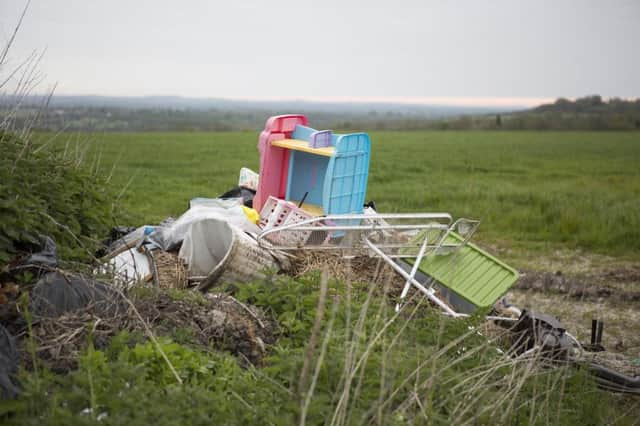Jayne Dowle: My local woods show the scale of fly-tipping in Yorkshire


That’s the thing with fly-tipping. Once an area becomes an established dumping ground there is no turning back. It just ends up even more scarred and contaminated, a no-go area for residents, dog-walkers and wildlife.
Last week the Forestry Commission closed the car-park in the woods until further notice, “due to increased levels of unacceptable littering and fly-tipping”. The official announcement points out that it will only reopen when a solution has been found.
Advertisement
Hide AdAdvertisement
Hide AdIs the solution to fine householders who unwittingly use an illegal waste carrier to dispose of their household rubbish? I think not. But it’s being put forward by Environment Minister Thérèse Coffey as the answer.
Her recommendations will allow local authorities to fine householders who fail to take “reasonable measures” to ensure that their waste is not being illegally disposed of. The penalty could be up to £400. And to save court costs, a fine could be imposed on-the-spot.
So if a man in a van turns up to your front door and offers to shift that old armchair for £10, tread very carefully. Chances are he’s an illegal fly-tipper who will fleece innocent householders out of their hard-earned cash, promise to get rid of their rubbish effectively, then jettison it all in the nearest field.
Should you fall for his patter, you’ll be the one in the wrong. How does that work then? Well, to be fair, you should always check that a waste disposal firm has a legal licence. Not everyone knows this however. What if the victim of the crime – because fly-tipping is a crime under the Clean Neighbourhoods and Environment Act – is an elderly or vulnerable person? How mortified would they be to know they had committed some kind of offence?
Advertisement
Hide AdAdvertisement
Hide AdAnd of course there is the danger that cash-strapped councils would take advantage of this proposal and use on-the-spot fines to bolster their own coffers. We’ve seen it happen with similar penalties for dropping litter in towns and cities.
Why can’t the authorities concentrate all their efforts on stamping out those who make a business out of taking advantage of people like this? We can’t turn a blind eye and allow kangaroo-court justice to prevail while persistent perpetrators go free.
There is something quite morally wrong about putting the onus on householders when the real culprits are getting away with selfish and irresponsible behaviour. I know that fly-tipping is punishable by a maximum fine of up to £50,000 or five years imprisonment, but this doesn’t seem enough of a deterrent. What’s needed is more enforcement. This however, would demand huge amounts of government investment.
There is absolutely no point in picking on householders when the problem is so much bigger. Ministers should be prepared to exercise their muscle and ask the police and other agencies to enforce the law with vigour. There’s a 25-year Environment Plan apparently, but without teeth it’s just another piece of paper blowing in the wind.
Advertisement
Hide AdAdvertisement
Hide AdAnd also, what about all the careless individuals who litter our countryside but don’t happen to be illegal fly-tippers? Are there plans to crack down on these too? There should be. There are plenty who can’t be bothered to drive to the nearest civic amenity centre – known round here as “the tip” – and just drop their old clothes and household goods in the hedgerow. And what about the lazy teenagers who toss their takeaway cartons out of the car window? And the builders who think it’s OK to turf out bulging sacks of old plaster onto the side of the road instead of paying a nominal sum for a refuse licence.
What is clear though is that fly-tipping and littering is definitely on the increase. In 2016/17 local councils in England dealt with around one million fly-tipping incidents – defined as illegally throwing away any rubbish onto land which does not have a licence to accept it. This represents a seven per cent increase on the previous year.
The cost of this “waste crime” to the economy is estimated at more than £600m, including lost landfill tax and clean-up costs.
This is not a cost which should be borne by blameless householders acting in good faith. It should be directed not just at illegal waste carriers but at every single individual who thinks it is acceptable to drive through the countryside dumping rubbish as they go. I suggest therefore, that Therese Coffey and her colleagues cast their horizons further than their windows in Westminster, get their wellies on and come and have a look at my local woods.